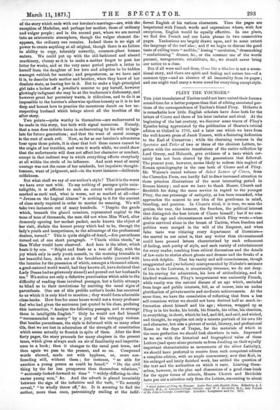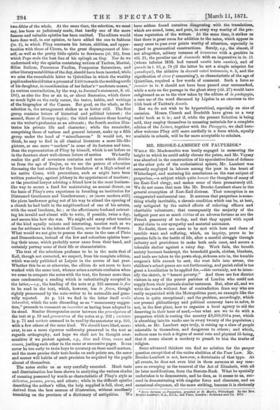PLINY THE YOUNGER.*
THE joint translators of Tacitus could not have united their forces a second time for a better purpose than that of editing annotated por- tions of the correspondence of Tacitus's friend Pliny. Hitherto it is remarkable how little English scholars have done both for the letters of Cicero and those of his later imitator and rival. At the beginning of the last century, we discover some traces of Pliny's Epistles being appreciated by the publication of Hearne's critical edition at Oxford in 1703, and a later one which we have from the well-known press of Jacob Tonson, with a flattering dedication to the Earl of Carnarvon ; while the charming versions in the Spectator and Taller of two or three of the choicest Letters, to- gether with the successive translations of the entire collection by Lord Orrery, and Melmoth, give evidence of a taste which cer- tainly has not been shared by the generations that followed. The present year, however, seems likely to redress this neglect of Roman epistolo,graphy in the case both of Cicero and of Pliny. Mr. Watson's recent volume of Select Letters of Cicero, from the Clarendon Press, can hardly fail to draw increased attention to those priceless illustrations of the most interesting perioa in Roman history ; and now we have to thank Messrs. Church and Brodribb for doing the same service in regard to the younger Pliny, the one personage of antiquity, as has been remarked, who approaches the nearest to our idea of the gentleman in mind, breeding, and position. In Cicero's rival, it is true, we miss the genius, the ease, the humour, the freedom, the political interest that distinguish the best letters of Cicero himself ; but if we con- sider the age and circumstances amid which Pliny wrote—when genius survived alone in the breast of Tacitus, when freedom and politics were merged in the will of the Emperor, and when false taste was vitiating every department of literature— the marvel to our mind is, that any writer thus circumstanced could have penned letters characterized by such refinement of feeling, such purity of style, and such variety of entertainment for every reader, reaching from ethical discussions and the details of law-suits to stories about ghosts and dreams and the freaks of a love-sick dolphin. That his vanity and self-consciousness, though exaggerated and (we believe) misrepresented by Niebulir's estimate of him in the Lectures, is occasionally tiresome, we do not deny. In his craving for admiration, his love of attitudinizing, and in kindred weaknesses, Pliny's temperament was eminently French, while vanity was the natural disease of an age which, excluded
from large and public interests, fell, as of course, into an undue glorification of private merits and mediocre achievements. At the same time, we have the consolation of reflecting that from a less self-conscious writer we should not have derived half so much in- formation about himself and his age ; whereas, wrapped up as
Pliny is in his books, his briefs, his friends, his villas, his charities, in everything, in short, which he had, and did, and said, and wished, and thought, he supplies not only a minute portrait of his own life and character, but also a picture of social, literary, and professional Rome in the days of Trajan, for the materials of which in the same perfection we should look elsewhere in vain. Impressed as we are with the historical and biographical value of these Letters (and space alone prevents us from dwelling on their equally important characteristics as monuments of the silver Latiuity), we should have preferred to receive from such competent editors a complete edition, with an ample commentary, now that Keil, in his enlarged and lately finished work, has settled the question of the text and the authorities on which it rests. Limiting them- selves, however, to the plan and dimensions of a good class-book for the upper forms of schools, Messrs. Church aud Brodribb have put out a selection only from the Letters, amounting to about • Select Letters of Pliny the Younger. Latin Test, with English Notes. Edited by A. J. Church, M.A., of Lincoln College, Oxford ; and W. J. Brodribb, MA., late below of St. John's College, Cambridge. London : Longman and Co. 1871.
two-fifths of the whole. At the same time, the selection, we must say, has been so judiciously made, that hardly one of the more famous and valuable epistles has been omitted. The editors would have done well, in our opinion, to have added the one to Sabiuus (ix. 2), in which Pliny contrasts his letters, abilities, and oppor- tunities with those of Cicero, to the great disparagement of him- self, as well as the pretty little epistle to Servianus (vi. 26), from which Pope stole the best line of his epitaph on Gay. Nor do we understand why the epistles containing notices of Tacitus, Martial, Silius Italicus, Passennua Paullus, Pomponius Saturninus, and other literary notabilities of the day, should have been inserted, while we miss the remarkable letter to Qaintilian in which the wealthy pupilmakeshis old tutor a presentof 1400 towards the wedding outfit of his daughter, iOconsideration of her father's "moderate means," (a carious contradiction, by the way, to Juvenal's statement, S. vii. 186), as also the five or six to, or about Suetonius, which throw so much light on the early career, the tastes, habits, and writings of the biographer of the Closers. But good, on the whole, as the selection is, the arrangement strikes us as better still. The first group contains letters of historical and political interest ; the second, those of literary topics ; the third embraces those bearing on the writer's profession as an advocate ; the fourth section illus- trates his private life and character ; while the remainder, comprising those of various and general interest, make up a fifth group under the head of "miscellaneous." It would not, we think, be easy to find in all classical literature a more life-like picture, or one more "modern" in some of its features and tone, than the representation of Pliny by himself, which is set before us in the fourteen short well-chosen letters of section We hardly realize the gulf of seventeen centuries and more which divides us from the age of Trajan, as we see the patron of education discussing the best scheme for the foundation of a High school at his native Como, with precautions, such as might have been written yesterday, against jobbery in the appointment of teachers ; or the practical lawyer advising a friend how in the most business- like way to secure a fund for maintaining an annual dinner, on the basis of Pliny's own experience in founding an institution for Distressed Gentlemen and Gentlewomen ; or (more modern still) the pions landowner going out of his way to attend the opening of a church he had built in the neighbourhood of one of his estates, with the usual luncheon, &c. ; or the affectionate husband entreat- ing his invalid and absent wife to write, if possible, twice a day, and assure him how she was. We might add many other touches of the kind equally minute and interesting, touches such as we see far seldomer in the letters of Cicero, never in those of Seneca. What would we not give to possess the same in the case of Plato and Demosthenes, instead of the few and colourless epistles bear- ing their name, which probably never came from their hand, and certainly portray none of their life or characteristics.
The text of the selections professes to be in the main that of Keil, though not corrected, we suspect, from his complete edition, which was only published at Leipsic in the course of last year. Whether this be so or otherwise, the editors do not seem to have worked with the same text, whence arises a certain confusion when we come to compare the notes with the text, the former more than once condemning a reading which is unhesitatingly accepted in the latter,—e.g., the heading of the note at p. 225 assumes in fine to be read in the text, which, however, has in .finem, though rightly pronounced by the note-writer to be untenable and gene- rally rejected. At p. 144 we find in the letter itself oculis inhxrebat, which the note discarding as an "unnecessary sugges- tion," proceeds to comment on inerrabat as having been adopted in its stead. Similar discrepancies occur between the provulgatum of the text at p. 59 and provocatum of the notes at p. 202 ; varietate in p. 71 and veritate assumed to be read by the annotator at p. 209, with a few others of the same kind. We should have liked, more- over, to see a more rigorous uniformity preserved in the text as regards orthography, and hope we shall not be thought over- sensitive if we protest against, e.g., liens and littus, cause and caussa, jostling each other in the same or successive pages. It can never be too early to train boys to accuracy on these small matters, and the more precise their text-books on such points are, the surer and sooner -will habits of such precision be acquired by the pupils almost of themselves. _ The notes strike us as very carefully executed. Much taste and discrimination has been shown in analyzing the various shades of meaning possessed by words so characteristic of Pliny's style as delicatus, pressus, purus, and others ; while in the difficult epistles describing the author's villas, the help supplied is full, clear, and derived from the best sources of illustration, without needlessly trenching on the province of a dictionary of antiquities. We have seldom found ourselves disagreeing with the translations, which are sound, terse, and pure, in every way worthy of the pre- vious reputation of the writers. At the same time, it strikes us that there is great room for addition to the notes, which appear in many cases to pass over points worthy of attention, especially in regard to grammatical constructions. Surely, e.g., the almost, if not altogether, solitary instance of irreverens with a genitive in viii. 21, the peculiar use of dununodo with an imperative in iv. 13. (where inferior MSS. had turned nuntia into nunties), and of guando in i. 10, p. 79 (if the latter be not a simple misprint for guandogue), the ablative in decessit veteri testamento, v. 5, and the signification of circa('concerning'), so characteristic of the age of Quintilian, required a few words, of comment. Such a form as juvenior in iv. 8 should not have been passed over unremarked, while a note on the passage in the ghost story (vii. 27) would have enlightened us as to the view taken by the editors of in pmdagogio, a rare use of the word discussed by Lipsius in an excursus to the 15th book of Tacitus's Annals.
But we do not wish to be hypercritical, especially on sins of omission. Messrs. Church and Brodribb have given us a very useful book as it is; and if, while the present Selection is being sold, they employ themselves in amassing materials for a complete edition of the Letters, together with the Panegyric, we shall here-, after welcome Pliny still more cordially in a form which, equally available in schools, will be far more acceptable to scholars.



































 Previous page
Previous page